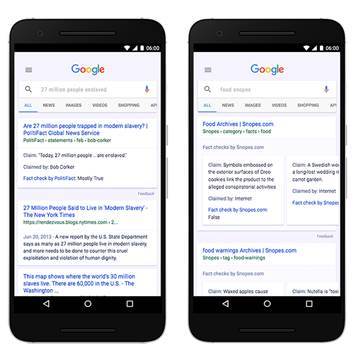You may be wrong and Google, ever the kind friend, is now ready to gently let you know next time you search for something that may not be true, or so-called “fake news.”
Google’s “fact check label,” which launched last October in Google News, is now launching globally in search on contested subjects.


Related: Confusing Fact and Fiction? Google’s New Tags Can Help
When you do see the new feature at the top of your search results, it will share a claim, usually on a more serious topic, along with who made it.
A fact check carried out by one of Google’s partners will be listed below, letting you know whether the claim is truthful or has been debunked. In cases when several publishers have fact checked the same item and reached different conclusions, Google will also let you know.
For instance, Senator Bob Corker recently claimed that 27 million people are trapped in modern slavery. Google will now tell you that the claim is “mostly true,” as determined by Politifact, an independent fact-checking website. Clicking through to that article would show you that that number was researched and found to be in line with international human rights organizations’ research and estimates.
The project is a joint effort between Google and Jigsaw, a tech incubator under the umbrella of Google’s parent company, Alphabet.
“As we make fact checks more visible in Search results, we believe people will have an easier time reviewing and assessing these fact checks, and making their own informed opinions,” Justin Kosslyn, a product manager at Jigsaw and Cong Yu, a Google research scientist, said in a blog post.
Of course who is doing the fact checking could also be a point of debate. Publishers wishing to contribute will have to adhere to Google News’ general guidelines and be “algorithmically determined to be an authoritative source of information” before they can contribute.






